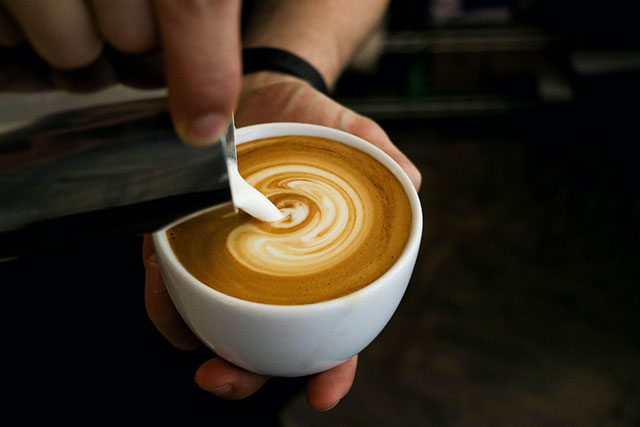
2-4 Workdays Article No. 2744
Article No. 2744

2-4 Workdays Article No. 2792
Article No. 2792

2-4 Workdays Article No. 2798
Article No. 2798

2-4 Workdays Article No. 2797
Article No. 2797

2-4 Workdays Article No. 2795
Article No. 2795

2-4 Workdays Article No. 2794
Article No. 2794

2-4 Workdays Article No. 2796
Article No. 2796

2-4 Workdays Article No. 2791
Article No. 2791

2-4 Workdays Article No. 2325
Article No. 2325

2-4 Workdays Article No. 2962
Article No. 2962

2-4 Workdays Article No. 2016
Article No. 2016

Unavailable Article No. 2925
Article No. 2925
Cappuccino cups: the secret of a good awakening
 There is an unbridgeable gap between those who love to start the day with the strong and decisive taste of a good espresso and those who want to enjoy the prolonged pleasure of a nice and foamy cup of cappuccino.
There is an unbridgeable gap between those who love to start the day with the strong and decisive taste of a good espresso and those who want to enjoy the prolonged pleasure of a nice and foamy cup of cappuccino.
It is well known that Italians are fond of tradition, yet, despite their love for the fragrant espresso and frothed milk-based drink, few people allow themselves the luxury of a good cappuccino in the morning. This is because in most Italian kitchens, the most fundamental element is missing: the cappuccino cups!
The right cup is the basis of every preparation, the keystone without which your cappuccino will have to wait for you at the bar counter.
Cups and cappuccino: an ancient history
Italy is the country where cappuccino is most popular, but the history of the delicious drink that warms the hearts of Italians is unknown to many.
 It is usually thought that the name is due to the colour of the drink, which recalls that of the habit of the Capuchin friars. In fact, this interpretation is not very far from the most accredited hypothesis, according to which the cappuccino was born almost 400 years ago, probably in Vienna, indeed by the hand of a Friulian Capuchin friar who wanted to mix a too strong coffee with milk, animating the reaction of those who saw him, who simply exclaimed “Kapuziner!”, cappuccino in German.
It is usually thought that the name is due to the colour of the drink, which recalls that of the habit of the Capuchin friars. In fact, this interpretation is not very far from the most accredited hypothesis, according to which the cappuccino was born almost 400 years ago, probably in Vienna, indeed by the hand of a Friulian Capuchin friar who wanted to mix a too strong coffee with milk, animating the reaction of those who saw him, who simply exclaimed “Kapuziner!”, cappuccino in German.
Other voices, more credible but less amusing, claim that the origin of the preparation is the experimentation of various owners of Viennese coffee shops, in search of new coffee blends. The Austrian idea was then refined in the years to come thanks to Italian ingenuity: the milk was frothed, the proportions between coffee and milk were perfected and a special cup was created to accommodate the right amount of drink without losing too much heat.
Thus the cappuccino that we all know was born.
The secret to a good cappuccino? A matter of proportions!
Cappuccino is not simply a coffee enriched with milk. The cappuccino is the result of a careful study and a high commitment to art. The ideal proportions of the drink are 25 ml of espresso coffee and 125 ml of frothed milk and the froth must represent a third of the cup; according to the rules of the classic recipe, this balance allows to obtain a sweet and persistent taste, accompanied by an enveloping creaminess.
As we all know, however, rules are made to be broken, so those who prefer a more decisive and energetic taste can add more coffee, while those who prefer to dive into a smooth drink and the enveloping flavor of hot milk can reduce the amount of espresso. De gustobus non disputandum est! (There is no arguing about taste!)
The constant for a good cappuccino is always the cappuccino cup. It is essential that it be thick and made of porcelain; it doesn't matter if it's white, coloured or decorated. Each cup is designed to accommodate the right amount of drink, about 150ml, and to keep it hot for as long as possible. The elegant and unique shape can be recognized at a glance.
Serve your guests with the right cappuccino cups to make a lasting impression
 The cappuccino cups are not included in traditional services and, worse still, some people use teacups to serve their cappuccino, compromising the foam and the consistency of the drink.
The cappuccino cups are not included in traditional services and, worse still, some people use teacups to serve their cappuccino, compromising the foam and the consistency of the drink.
We say: NO! A cappuccino needs its low and wide cup to release its intense and delicate flavor and to be enjoyed at it's best.
The cappuccino cups add just the right touch of class and professionalism to your preparation. Whether it is to amaze guests and friends and make them understand that cappuccino is a serious matter, to practice your "latte art" and make foamy designs, or that you prefer to pamper yourself with a sweet wake-up treat, the right cup will be always the centrepiece of the moment.


























